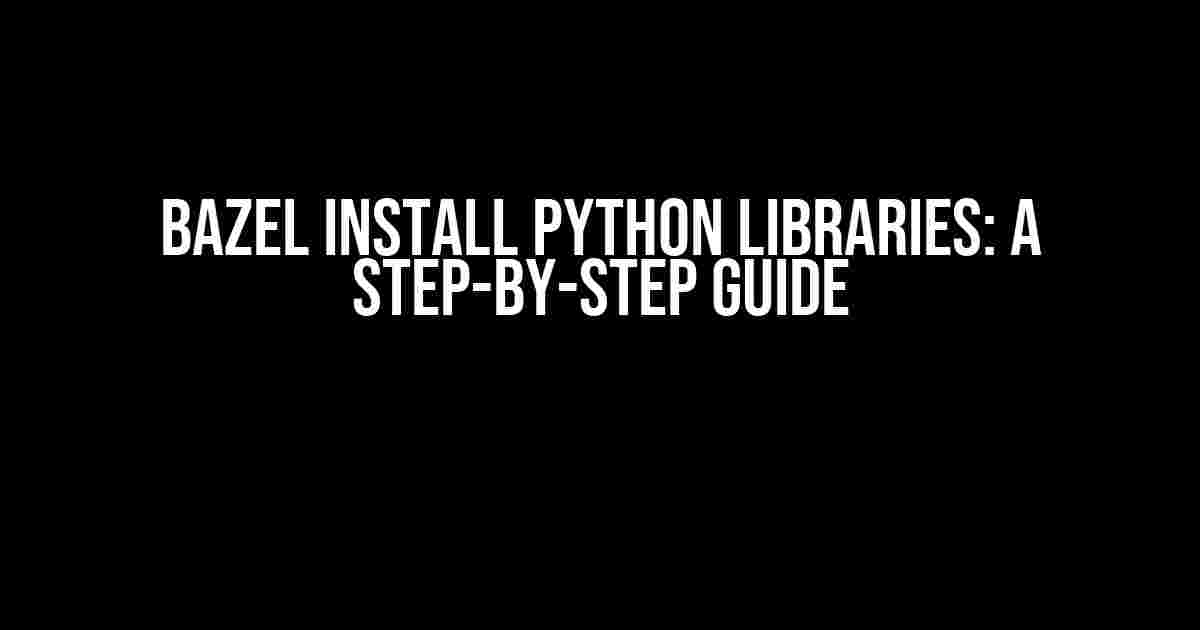Are you tired of struggling to manage your Python dependencies with Bazel? Do you want to learn how to seamlessly install and integrate Python libraries into your Bazel project? Look no further! This comprehensive guide will walk you through the process of installing Python libraries with Bazel, covering everything from setting up your workspace to best practices for dependency management.
Getting Started with Bazel and Python
Bazel is a powerful build tool developed by Google that allows you to manage and build your projects efficiently. Python is one of the many languages supported by Bazel, making it an ideal choice for Python developers. To get started, you’ll need to have Bazel installed on your system. If you haven’t already, follow the instructions on the Bazel installation page.
Creating a Bazel Workspace
Before you can start installing Python libraries, you need to create a Bazel workspace. A workspace is the top-level directory that contains all your project files. Create a new directory for your project and navigate to it in your terminal:
$ mkdir my_project
$ cd my_projectNext, create a WORKSPACE file in the root of your project directory:
$ touch WORKSPACEThis file is used to configure your Bazel workspace. For now, leave it empty. We’ll come back to it later.
Installing Python Libraries with Bazel
To install Python libraries with Bazel, you’ll need to use the py_library rule. This rule allows you to define a Python library and specify its dependencies.
Installing a Single Python Library
Let’s start by installing a single Python library. For this example, we’ll use the popular requests library. Create a new file called BUILD in the root of your project directory:
$ touch BUILDIn the BUILD file, add the following code:
py_library(
name = "requests",
version = "2.25.1",
deps = ["@pip_deps//:requests"],
)This code defines a Python library called requests with version 2.25.1. The deps attribute specifies the dependencies required by the library. In this case, we’re using the @pip_deps//:requests dependency, which is provided by the pip_deps repository.
Next, create a repositories.bzl file in the root of your project directory:
$ touch repositories.bzlIn this file, add the following code:
http_archive(
name = "pip_deps",
urls = ["https://github.com/bazelbuild/rules_python/blob/master/third_party/pip_deps/requirements.bzl"],
sha256 = "4baa537e5244a4a5e5a7556451555",
)This code defines the pip_deps repository, which provides the requests dependency.
Installing Multiple Python Libraries
Installing multiple Python libraries is similar to installing a single library. You can define multiple py_library rules in your BUILD file:
py_library(
name = "requests",
version = "2.25.1",
deps = ["@pip_deps//:requests"],
)
py_library(
name = "numpy",
version = "1.20.0",
deps = ["@pip_deps//:numpy"],
)requests and numpy. Each library has its own dependencies specified in the deps attribute.
Managing Dependencies with Bazel
Bazel provides a powerful way to manage dependencies between your Python libraries. You can specify dependencies using the deps attribute in your py_library rule.
Direct Dependencies
A direct dependency is a library that is directly required by your project. For example, if your project uses the requests library, you would specify it as a direct dependency:
py_library(
name = "my_library",
deps = ["@my_workspace//:requests"],
)In this example, the my_library library depends directly on the requests library.
Transitive Dependencies
A transitive dependency is a library that is required by one of your direct dependencies. For example, if the requests library depends on the urllib3 library, you wouldn't need to specify urllib3 as a direct dependency. Bazel will automatically include it as a transitive dependency:
py_library(
name = "requests",
version = "2.25.1",
deps = ["@pip_deps//:urllib3"],
)
py_library(
name = "my_library",
deps = ["@my_workspace//:requests"],
)In this example, the requests library depends directly on the urllib3 library, which is then included as a transitive dependency in the my_library library.
Best Practices for Dependency Management
Here are some best practices to keep in mind when managing dependencies with Bazel:
- Keep your dependencies up-to-date: Regularly update your dependencies to ensure you have the latest versions.
- Use consistent dependency versions: Use the same version of a dependency across your entire project to avoid conflicts.
- Avoid duplicate dependencies: Use Bazel's dependency resolution to avoid duplicating dependencies in your project.
- Document your dependencies: Clearly document your dependencies in your
BUILDfile to make it easy for others to understand your project's dependencies.
Conclusion
In this article, we've covered the basics of installing Python libraries with Bazel. We've learned how to create a Bazel workspace, define Python libraries, and manage dependencies using the py_library rule. By following these steps and best practices, you'll be able to efficiently manage your Python dependencies and build robust projects with Bazel.
| Library | Version | Dependency |
|---|---|---|
| requests | 2.25.1 | urllib3 |
| numpy | 1.20.0 | None |
Remember to stay organized, keep your dependencies up-to-date, and follow best practices to ensure your project's success.
Frequently Asked Question
Get ready to dive into the world of Bazel and Python libraries!
What is the best way to install Python libraries using Bazel?
You can install Python libraries using Bazel by adding the `pip_install` rule to your `BUILD` file. This rule allows you to specify the Python packages you want to install and their versions. For example, to install the `requests` library, you would add the following code to your `BUILD` file: `pip_install(name = "requests", version = "2.25.1")`.
How do I specify the Python version for my Bazel project?
You can specify the Python version for your Bazel project by setting the `python_version` attribute in your `WORKSPACE` file. For example, to use Python 3.8, you would add the following code to your `WORKSPACE` file: `python_version = "3.8"`.
Can I use Bazel to install Python libraries from source?
Yes, you can use Bazel to install Python libraries from source using the `http_archive` rule. This rule allows you to download and install Python packages from source code repositories like GitHub. For example, to install the `scikit-learn` library from source, you would add the following code to your `BUILD` file: `http_archive(name = "scikit_learn", urls = ["https://github.com/scikit-learn/scikit-learn/archive/v0.24.2.tar.gz"], sha256 = "abcdef1234567890")`.
How do I manage dependencies between Python libraries in Bazel?
You can manage dependencies between Python libraries in Bazel by specifying the `deps` attribute in your `BUILD` file. This attribute allows you to specify the dependencies required by a Python library. For example, if your `my_library` depends on the `requests` library, you would add the following code to your `BUILD` file: `python_library(name = "my_library", srcs = ["my_library.py"], deps = ["@requests//:requests"])`.
Can I use Bazel to install Python libraries for multiple platforms?
Yes, you can use Bazel to install Python libraries for multiple platforms by configuring the `platforms` attribute in your `WORKSPACE` file. This attribute allows you to specify the platforms for which you want to build your Python libraries. For example, to build your Python libraries for both Linux and Windows, you would add the following code to your `WORKSPACE` file: `platforms = ["@bazel_tools//platforms:linux", "@bazel_tools//platforms:windows"]`.


